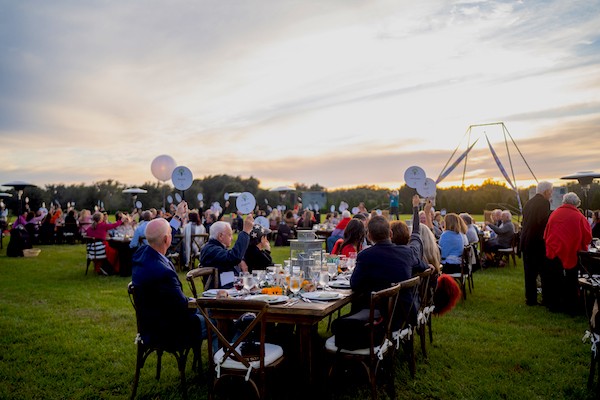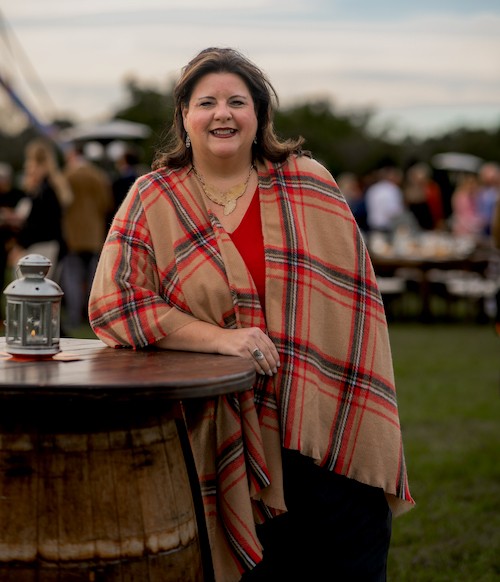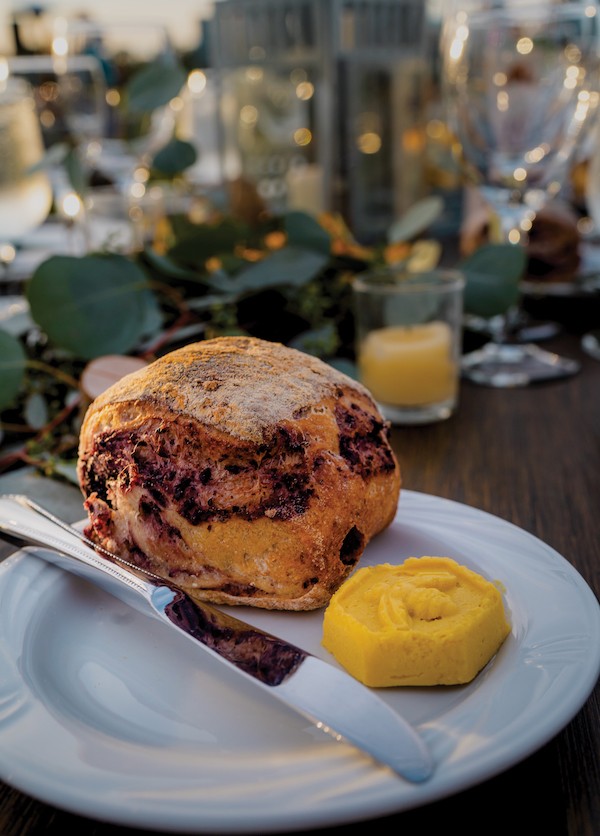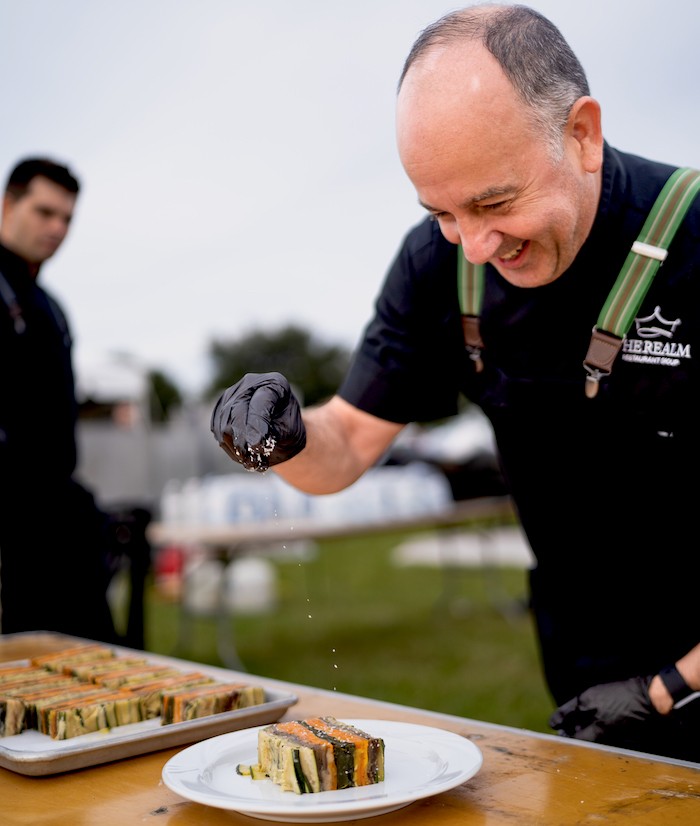resilient
(adj.) able to withstand or recover quickly from difficult or tough conditions.
retreat
(n.) a quiet or secluded place in which one can rest and relax.
Sarasota nonprofit, Resilient Retreat, brings two words and concepts together to help and empower survivors of trauma abuse by encouraging a healing journey of self-care and understanding community. Led by Certified Trauma Professionals and Certified Compassion Fatigue Professionals—including first responders and helping professionals that have experienced trauma themselves in the workplace (police, fire fighters, advocates, medical professionals, teachers, nonprofit workers)—those leading the Retreat’s recovery programs know firsthand just what individuals are going through. Resilient Retreat’s center broke ground in 2020 on their newly-acquired 84-acres of conservation land, and is expected to be completed later this year. In the meantime, the organization continues to offer their free, evidence-based day programs online and in-person for kindred souls who’ve encountered domestic violence, sexual violence, child abuse, sex trafficking, stalking, etc. within their lifetime. Programs created and integrated focus on bettering the mind, body and spirit—including equine therapy (horseback riding), Zentangle art drawing (a free-flowing, relaxing way to draw images of structured patterns called tangles), reflective journaling, neurofeedback, nutrition, massage, yoga, sound bath meditations and “Survivor Strong” support groups.
In order to continue funding Resilient Retreat’s free programs of light and respite, the nonprofit hosted an inaugural ‘Farm to Table’ outdoor dining experience this past November. A thriving philanthropic crowd attended for a magical evening among the majestic live oaks and orange-pink sunset sky on Resilient Retreat’s farmland east of 75. Attendees were able to see the 18,000 sq-ft Retreat Center construction in progress on the secluded, wide-open pasture of conservation and vegetation. “Having this unique retreat facility will provide us the opportunity to expand our services and to offer intensive multi-day retreats to those impacted by trauma and abuse,” said Lisa Intagliata, executive director of Resilient Retreat. “Our mission is more critical now than ever before. Last year we screened 196% more participants than the prior year.”
Creating a Farm to Table fundraiser was a natural fit for Resilient Retreat—seeing as their abundant acreage of idyllic land features a vegetable, herb and flower garden from which ingredients were harvested and utilized for guest’s meals at the event. “Our garden provided produce that will be used for dining during our retreats, and will also be used for participant programs like nutrition and cooking classes,” said Intagliata. “Nutrition plays an important role in dealing with psychological trauma. Eating a healthy diet can reduce the negative effects of stress on your body and builds a solid, more enduring foundation for your body by reducing oxidation and inflammation.”
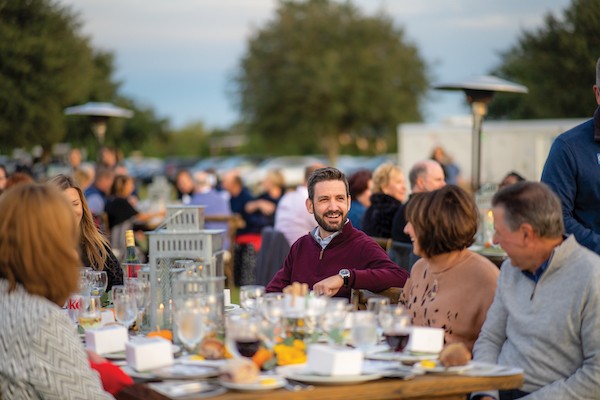
In true farm-to-table fashion, a select group of locally-renowned chefs and restaurateurs crafted a festive tasting menu inspired by the culinary history of Florida in celebration of Sarasota County’s Centennial. Served hor’dourves and multi-course dishes featured the very best of seasonal and foraged foods to create a truly enchanting, alfresco feast. Honorary Chair Chef Tommy Klauber, former owner of local restaurants Pattigeorge’s and Polo Grill & Fête Catering, was integral in establishing this epicurean event by helping to coordinate the farm-fresh menu and top local chefs who contributed their talents for the evening.
“Moments that really stood out for me during the evening,” shares Intagliata, “were hearing from each chef as they introduced their culinary creations to our guests, describing how they connected to our mission, or how they themselves are, or were, impacted by trauma in their lives.” Of the Chef lineup, dishes came from the innovative minds and hands of Jim Angus, Atria Cafe; Darwin Santa Maria, Almazónica Cervecería & Peruvian Eatery; Christopher Covelli, Sage Restaurant and Bijou Cafe; and Greg Campbell, GROVE and Pier 22.
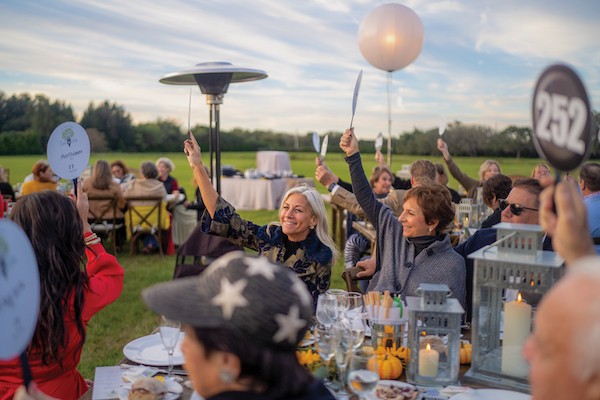
Chef Darwin Santa Maria | Almazónica Cervecería & Peruvian Eatery (@almazonicacerveceria)
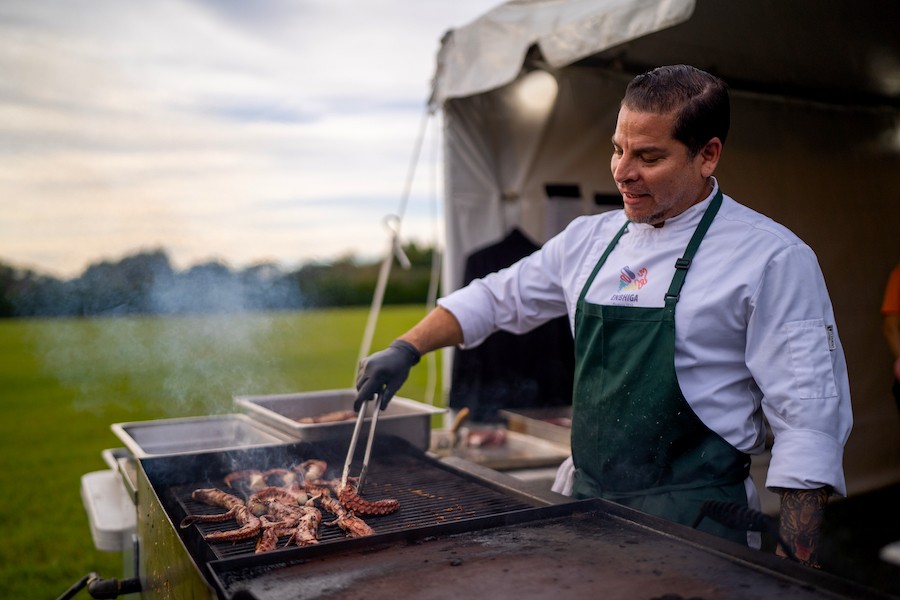
HOR D’OEUVRE: Beet Potato Causa (a cold casserole) rolled with Crab Meat, topped with Salmon Roe and Huancaina Aioli (Peruvian sauce made of Ají Amarillo chiles and queso fresco).
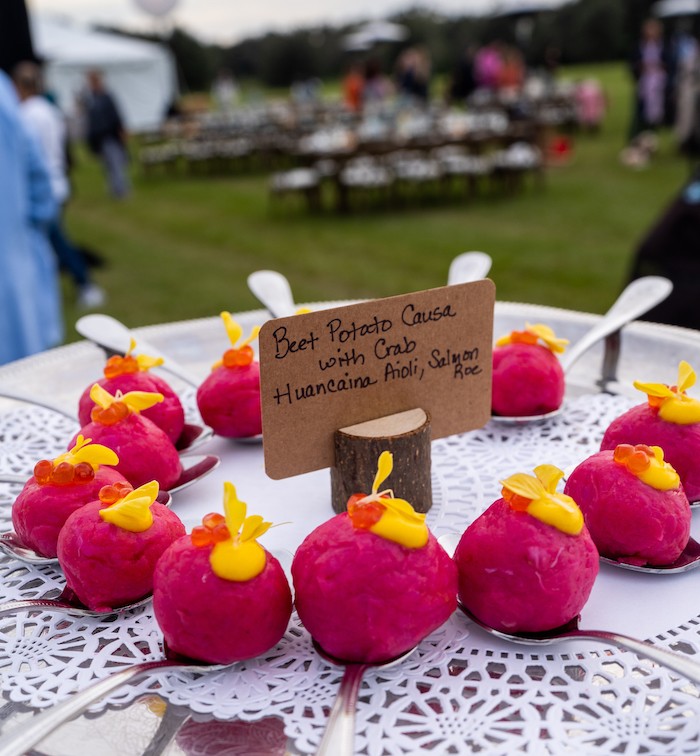
FIRST COURSE: char-rilled Octopus Anticuchero over top Aji Amarillo Potato Puree, drizzled with Black Olive Botija Aioli and garnished with locally-grown Microgreens.
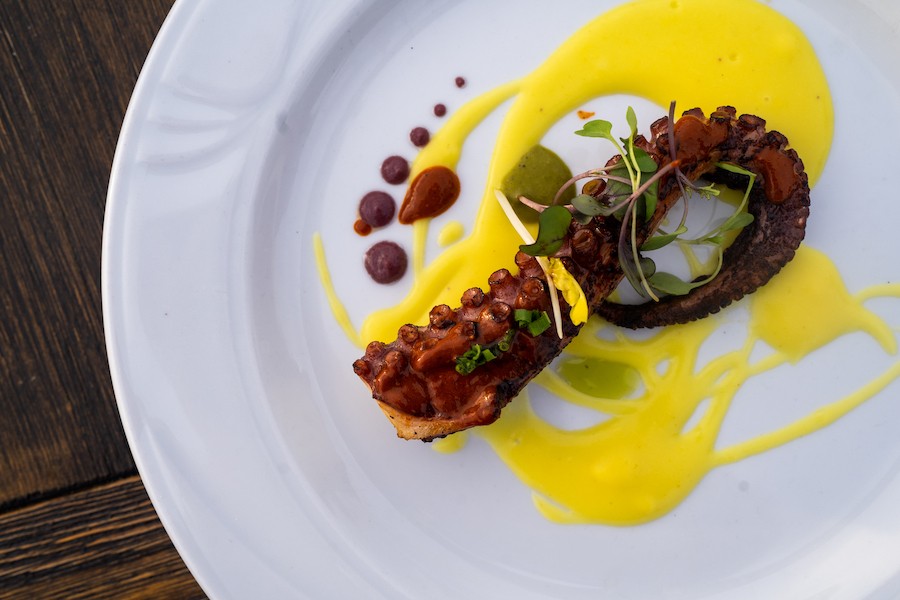
SRQ: What does the term “farm-to-table” mean to you in relation to mental health and physical wellness?
Santa Maria: First and foremost, caring for the planet. It also means health, wellness and welfare of what you put into your body. I learned that embracing the farm-to-table movement has great positive effects on the environment by promoting the ethical treatment of animals and food safety.
SRQ: How do you implement these ideals/standards into your dishes?
Santa Maria: After relocating to South Florida, we quickly recognized the vibrancy and depth of culture that the Amazon and Florida both share. At our restaurant, we make sure to shop at local farmers’ farms and purveyors. Locally grown food is full of so much flavor—we use them in a fusion with our small-batch ceviches and rich Peruvian dishes.
SRQ: Besides cooking up foods from your native country of Peru, what do you do to keep a healthy mind, body and spirit?
Santa Maria: Workout with weights, run and hang out with my kids.
Chef Jim Angus | Atria Cafe (@atria.cafe)
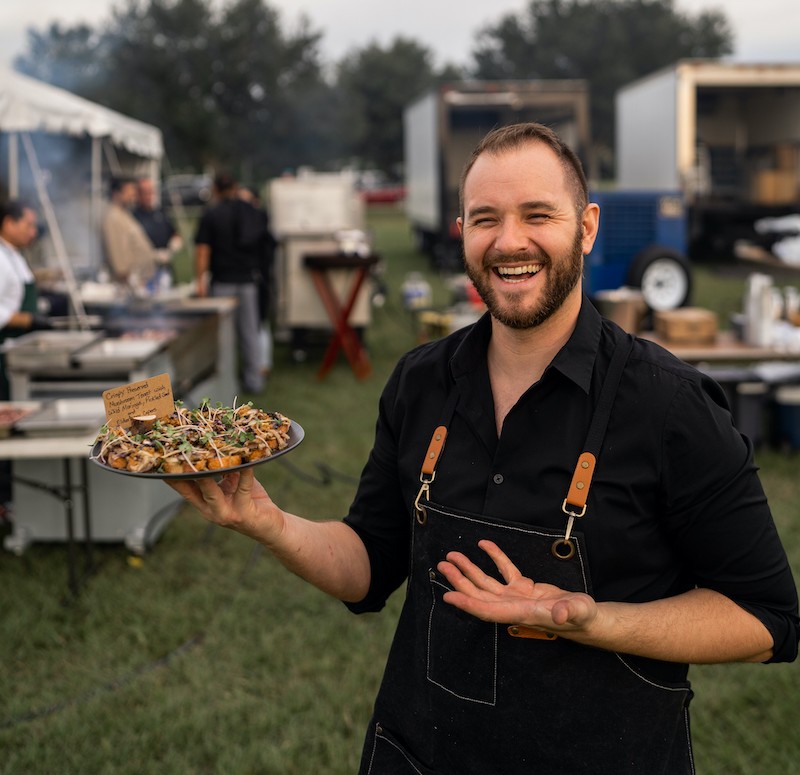
BREAD + BUTTER: Housebaked Heirloom Purple Maize Porridge Bread, paired with house-cultured honey butter made from local bee pollen of Myakka City’s Heritage Bee Farm.
HOR D’OEUVRES: Lions Mane and Black Pearl Oyster “Steak”, Wild Moringa, Pickled Seeds and Elderbery Capers on Toast; and Swamp Cabbage Scallops with Mote Marine Sea Pursland, Cortez Conserva Bottaga, Aerated Carotene Aioli and Key Lime Kosho.
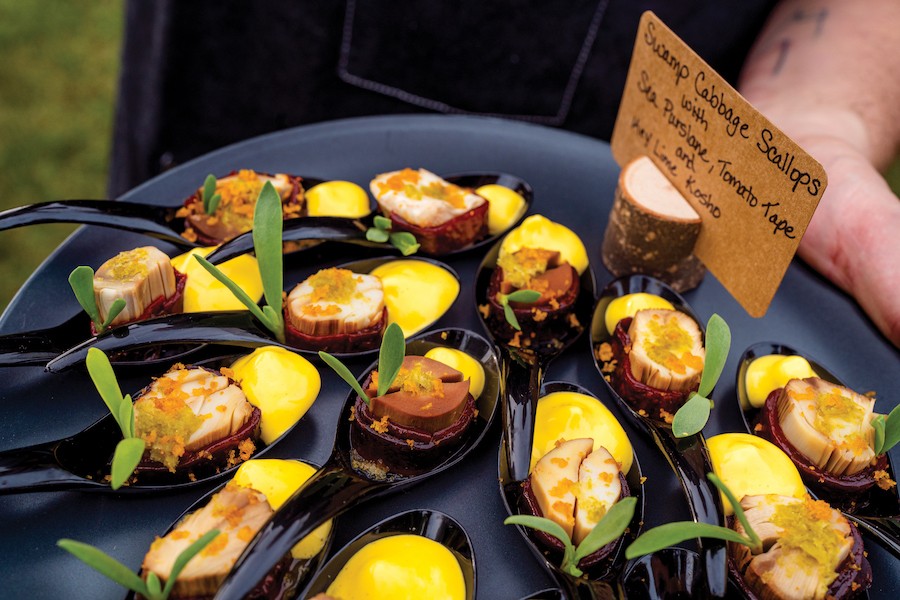
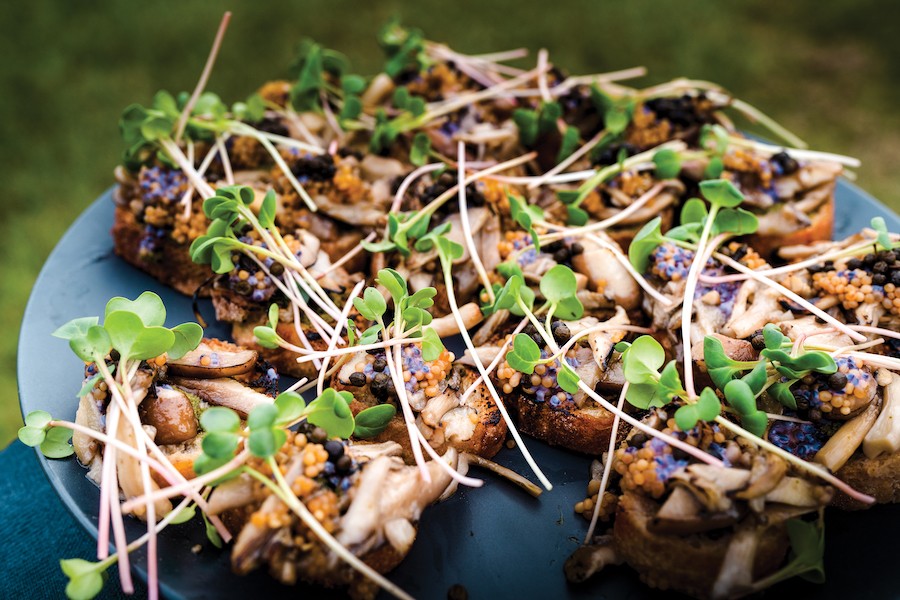
SECOND COURSE: Duck Confit with Lacto Fermented Datil Pepper, Smoked Muscadine Grapes, Sunchoke, Florida Persimmon and Hickory Nut Miso.
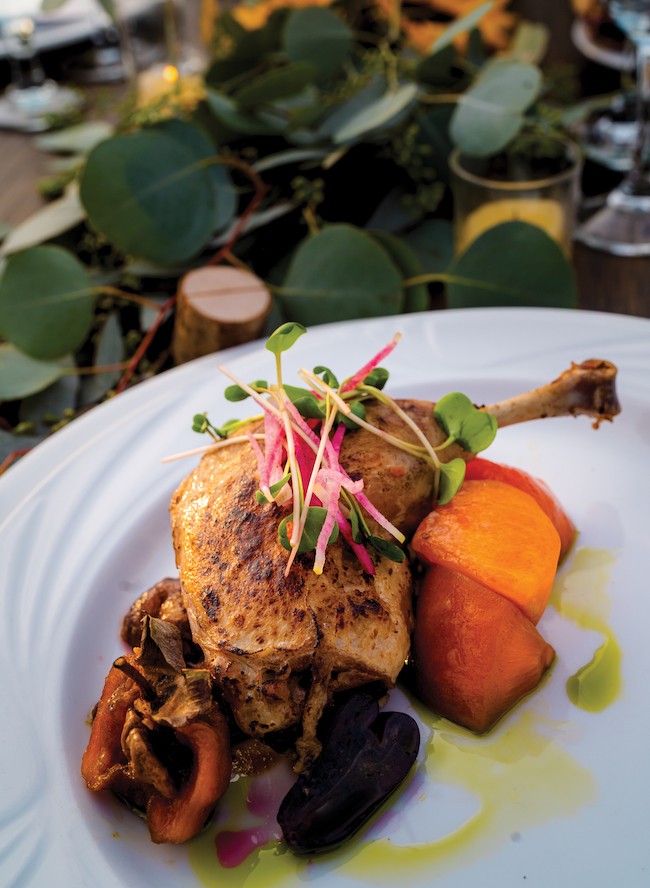
SRQ: What does the term “farm-to-table” mean to you in relation to mental health and physical wellness?
Angus: Farm-to-table is about nourishing ourselves and knowing where the food comes from. It allows us to connect with one another in the community with better food. It makes us naturally healthier and we feel good about what we are eating. In my view, farm-to-table shouldn’t be a style of food, but more about the highest ideal of what the food industry should be. We are working to get there, closer each day.
How do you implement these ideals/standards into your dishes at atria?
Angus: We use a lot of seasonal ingredients and try to show those off. In Florida, the weather changes are less extreme, so it’s easy to forget that we do have seasonal harvest. We try to utilize what is in season and grown locally as much as we can.
SRQ: How are you incorporating items from the local farms and how did you utilize them?
Angus: One of my favorite fruits that happens to be locally grown food is the Florida persimmon, grown by Jubilee Organics. Florida persimmons are too astringent to be eaten out of hand like an apple. However, they make excellent hoshigaki. Hoshigaki are persimmons that are peeled, hung, then massaged every day for a whole month. After a month, these little balls of starch transform into sugar bombs ready to pair with Duck Confit. For this dinner, we leaned heavily into wild foraged food. We got hickory nuts from Hickorynut Lake, elderberries that we turned into capers foraged near Lorraine Road, bee pollen from Chris at Heritage Bee Farm, wild moringa foraged in east Bradenton, and fresh hearts of palm that we got to harvest with the cowboys of Strickland Ranch. I’m particularly excited about the hearts of palm because I’ve wanted to forage them since moving to Florida in 2009. Wild food is around us and super plentiful—my vision is to see more chefs use it.
SRQ: Have you experienced personal trauma/hardship you’re open to sharing with readers that made you feel particularly drawn to Resilient Retreat?
Angus: I have worked with several people who have experienced severe trauma in one of my prior lines of work. Specifically, first responders are dealing with high-impact trauma, and oftentimes, they are so busy caring for others, not realizing that they need to be cared for as well after experiencing major trauma. I believe there aren’t enough places for people to discover healing, which is why it is so incredible what Resilient Retreat is doing to care for these individuals.
SRQ: What do you do to personally keep a healthy mind, body and spirit?
Angus: My wife, Weyli, and I started a business in the middle of a pandemic, so needless to say, staying healthy can be a challenge. Spending time with Weyli and my girls is the one thing I am not willing to compromise on—it is the most refreshing and important thing I do. The business demands so much from us, but if it puts relational strain on my marriage and family, it is not worth it and we reprioritize so that we can stay connected. I also devour dozens of audiobooks while working long hours, and Weyli and I decompress by watching movies.
Chef Christopher Covelli | The Realm Restaurant Group—Sage Restaurant and Bijou Garden Cafe (@sagesrq, @thebijou)
THIRD COURSE: Blackbeard's Ranch's Smoked Short Rib with a Key Lime and Prickly Pear Chutney, Succotash, Cod Croquettes and Hush Puppies
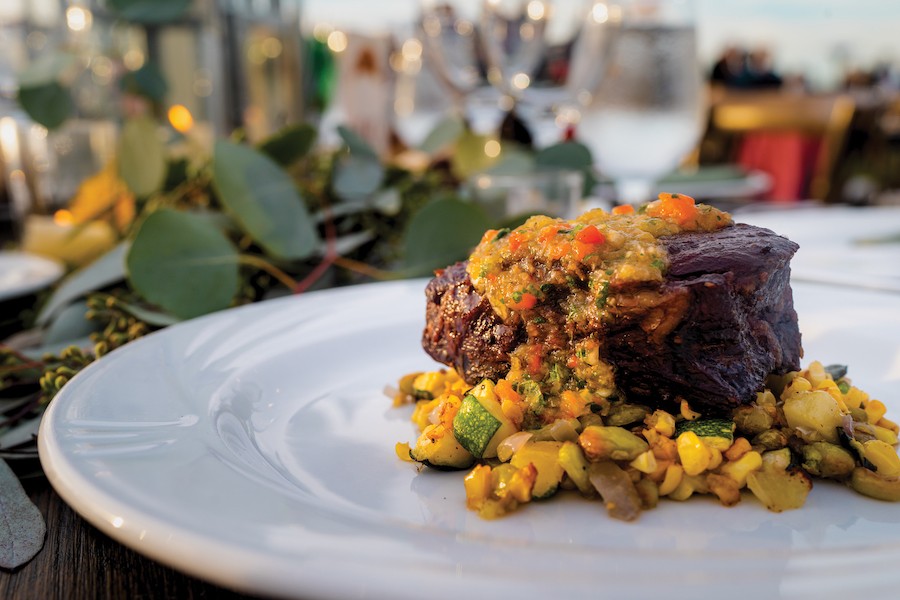
SRQ: What does the term “farm-to-table” mean to you in relation to mental health and physical wellness?
Covelli: Farm-to-table is how I grew up, it’s not a new concept to me having lived and worked in Italy for many years. Natural food/ingredients growing on your own property has everything to do with healthy living and mental health.
SRQ: What foraged ingredients did you choose to source and incorporate into your dish from local farms?
Covelli: Prickly Pear and Swamp Cabbage, aka Heart of Palm, which is an exclusively locally-grown ingredient. Amaranth is as well, which we used, and the short rib came from one of the nation’s finest beef producers, right here in Myakka City, FL at Blackbeard’s Ranch.
SRQ: Have you experienced personal trauma/hardship you’re open to sharing with readers that made you feel particularly drawn to Resilient Retreat?
Covelli: I recently lost my husband to Covid-19, he passed away while I was putting him to bed. I am interested in ways of dealing with this trauma since the visual of him passing doesn’t leave my mind every day. It was gratifying to do this event because you realize that people like myself are dealing with all different types of trauma like I am, and knowing you’re not alone helps. Just staring out into the trees while doing the event brought a sense of calm to me. Also, knowing that this retreat is right there, and will help others heal, made me feel good. It was emotional and rewarding.
Chef Greg Campbell | GROVE and Pier 22 Restaurant, Patio & Catering (@grove_lwr, @pier22dining)
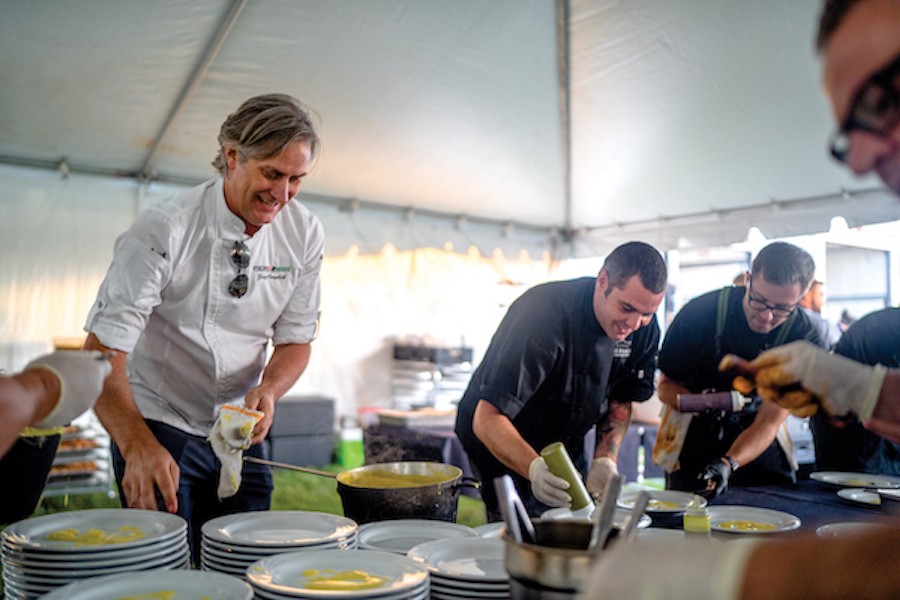
DESSERTS: A duo of Caramelized Guava Flambe over Vanilla Bean Ice Cream; and pan-fried Seminole Pumpkin Crepes with Orange Blossom Honey. Paired with a “Spiked” Coffee Bar
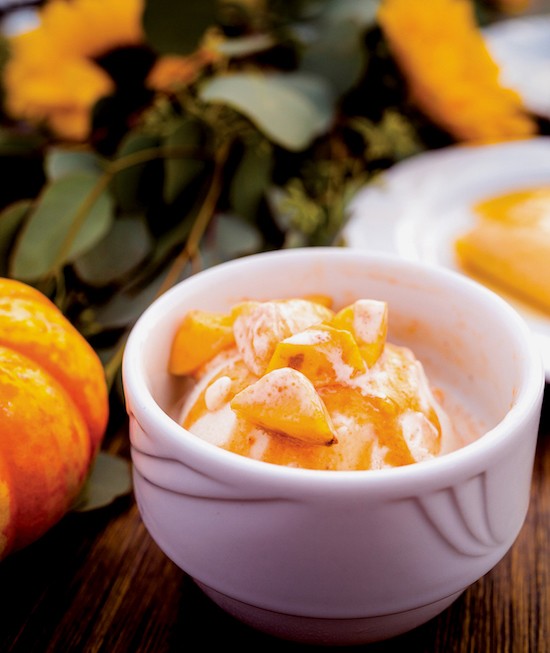
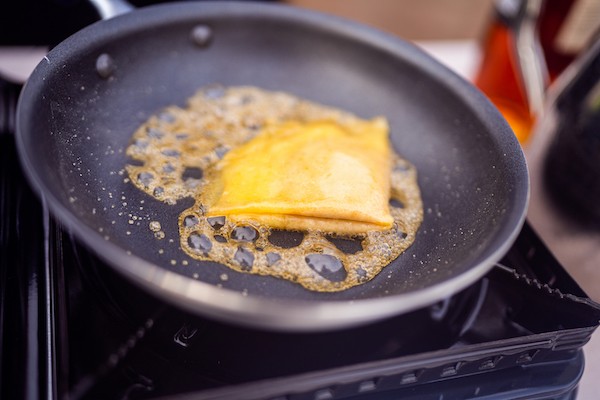
SRQ: What does the term “farm-to-table” mean to you in relation to mental health and physical wellness?
Campbell: Both mental and physical wellness are cultivated by our connections with what we eat. Not only in the physical sense by consuming raw, natural and minimally processed foods—which we know are more nutritious for the human body—but also in the metaphysical sense by understanding what we eat, where it comes from, and that labor involved in bringing food to our tables. A cornerstone of mental health is a feeling of purpose, grounding us to the present moment and being thankful for the gift of life offered to us through the food that grows from the soil.
SRQ: How do you implement these ideals/standards into your dishes and restaurants?
Campbell: Approaching each menu item, we prepare with that in mind—allowing us to maintain those values. Proteins should be simply prepared with minimal processing and only topped with sauces, gravies and spices that complement natural flavors and textures. Side dishes that are comprised of grains, fruits and vegetables are always cooked lightly to preserve nutritious qualities and optimal freshness.
SRQ: What are some of your favorite locally grown/foraged foods of the season? How are you incorporating them into your dish?
Campbell: Starfruit and guava are always highlights of the fall and winter seasons in Florida, as well as bumper crops of citrus and strawberries. Using them in simple applications like shortcakes and flambé over ice cream is a great way to highlight the peak flavors and textures, while minimal preparation also saves time in the kitchen.
SRQ: What do you do to personally keep a healthy mind, body and spirit?
Campbell: I always make sure to set aside time to reflect on my daily life. Setting goals and staying focused helps promote a sense of purpose and reason behind the motions I get caught up doing day-in and day-out. Being able to work with my hands to create, see, sense and touch is also imperative for me to promote a feeling of accomplishment in the course of a day’s work.
